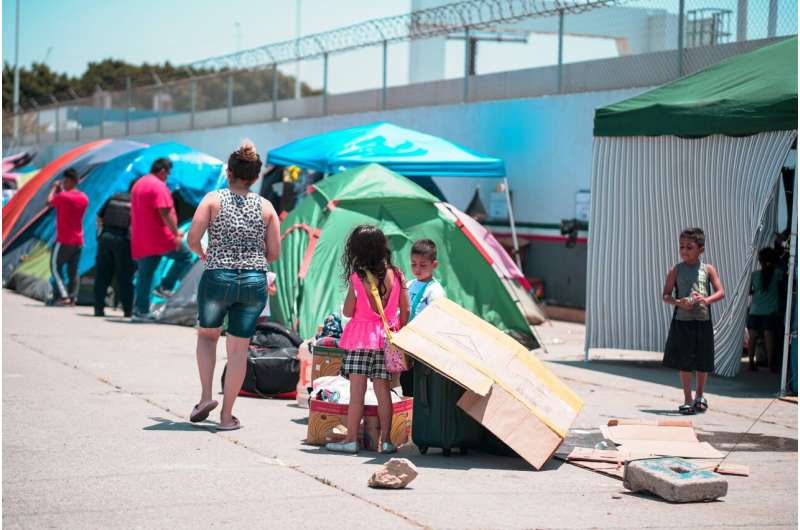This article has been reviewed according to Science X's editorial process and policies. Editors have highlighted the following attributes while ensuring the content's credibility:
fact-checked
trusted source
proofread
Lifesaving and life-changing: The kindness shown to forced migrants during their journeys

Forced migrant survivors of sexual and gender-based violence (SGBV) have experienced acts of everyday and extraordinary kindness from people they met throughout their journeys, a new study reveals.
Kindness ranged from incredible acts of bravery to help forced migrants escape dangerous situations to offers of shelter and food and medical care, to help with navigating the asylum system and developing friendships.
The study is the first time acts of kindness toward forced migrants during their journeys have been researched. Researchers from the SEREDA project at the University of Birmingham published their findings in the Journal of Ethnic and Migration Studies.
Through interviews with 166 forced migrant survivors of SGBV, the researchers learnt of a range of kindness the refugees had experienced on their journeys in the face of horrific cruelties at the hands of authority figures and smugglers among others.
Extraordinary encounters
Extraordinary encounters of kindness required outstanding acts of bravery from strangers to protect and help forced migrants.
For example, Fatma from Sierra Leone was repeatedly raped while imprisoned in a Libyan brothel. A guard noticed that she was 'very sick' and fearing she might die helped her to escape. Also in Libya, Fadila from Côte d'Ivoire was imprisoned for entering 'illegally,' but after explaining her story to a guard he helped her to escape imprisonment and leave the country.
Both guards noticed the pain and suffering of their captives and risked the possibly violent consequences of helping them.
Another example was shared by Samia who was in a violent marriage in Afghanistan and had escaped with her children to prevent her daughter's forced marriage.
They were sheltering in a hostel in Iran when her brother-in-law entered, hit her, and produced a gun, intending to kill her and return her children to Afghanistan. In an act of bravery and kindness, the hostel owner saved her by tackling the aggressor—allowing her to escape.
Samia said, "The owner of the hostel took his gun away and told him to leave for the night and come back the next morning and take me and children back. After he left, I talked to the owner of the hostel and told him that my husband's brother would kill me if they let him take me and my children. I asked them to take me to Turkey. They put me and my children in a truck and asked me where to go."
Everyday
More simple acts of kindness, while less dramatic, are no less important. Interviewees detailed multiple examples of these 'everyday' acts they experienced during their journeys. This included offers of shelter, food, hygiene and health products, transport and standing up for survivors in the face of racist interactions.
Other survivors described being advised how to claim asylum. Boadicea, from Guinea, recalled encountering a female passenger while flying to England to escape family abuse. The passenger told her to make an asylum claim and called a friend who helped Boadicea.
Mortaza, arriving in Sweden from Afghanistan, encountered a police officer who told him how to claim asylum. He told researchers, "She told me 'Good luck and welcome to Sweden again.' That made me feel very very good. After that, I went to the train station and told them I am seeking asylum and they gave me a free train ticket and told me where to go. I thought 'I am illegal here. How can help me this way?' It was a little shocking to me."
From kindness to care
The researchers found that these acts of kindness then generated other actions, particularly of care.
Natani was captured and raped by police in Libya and left for dead. She encountered a local woman who offered her shelter—once she was safe in the woman's home and the extent of her injuries became clear, the initial act of kindness morphed into longer-term support. Natani stayed with the woman and her husband for a month before they helped her leave the country.
Zahra, an Egyptian asylum seeker, visited a doctor in England to seek help with the psychological problems she experienced having been tortured. She unexpectedly encountered kindness from the receptionist when she told the woman that she needed medication because she wanted to kill herself. The receptionist befriended Zahra and visited her weekly at her asylum hostel. That initial act of kindness morphed into care and then friendship, which Zahra described as 'life-changing.'
She said, "I take care of myself because they love me. She [the receptionist] is like a mother to me. I love her very much. Last Saturday, she came to the hostel, and we spent the whole day together."
Jenny Phillimore, Professor of Migration and Superdiversity at the University of Birmingham, who led the research said, "This is the first time that instances of kindness experienced during these journeys have been researched. Normally, our focus is understandably on the nature of the sexual and gender-based violence encountered by forced migrants. By uncovering the importance of kind encounters, we present a fresh perspective on the journeys experienced by forced migrants.
"Our study reveals that kind encounters manifest across forced migration journeys and range from the extraordinary to the everyday. Such encounters offer vital help and support and can connect people across social barriers while fostering resistance against degrading bordering practices and help prevent further violence and danger.
"While these acts of kindness are heartening, the significance that our interviewees attach to these kinds of encounters underscores huge gaps in humanitarian protection and the normalization of cruelty towards forced migrants."
More information: Encounters with kindness: everyday and extraordinary kind interventions in the lives of forced migrant survivors of SGBV, Journal of Ethnic and Migration Studies (2024). DOI: 10.1080/1369183X.2024.234751
Provided by University of Birmingham




















